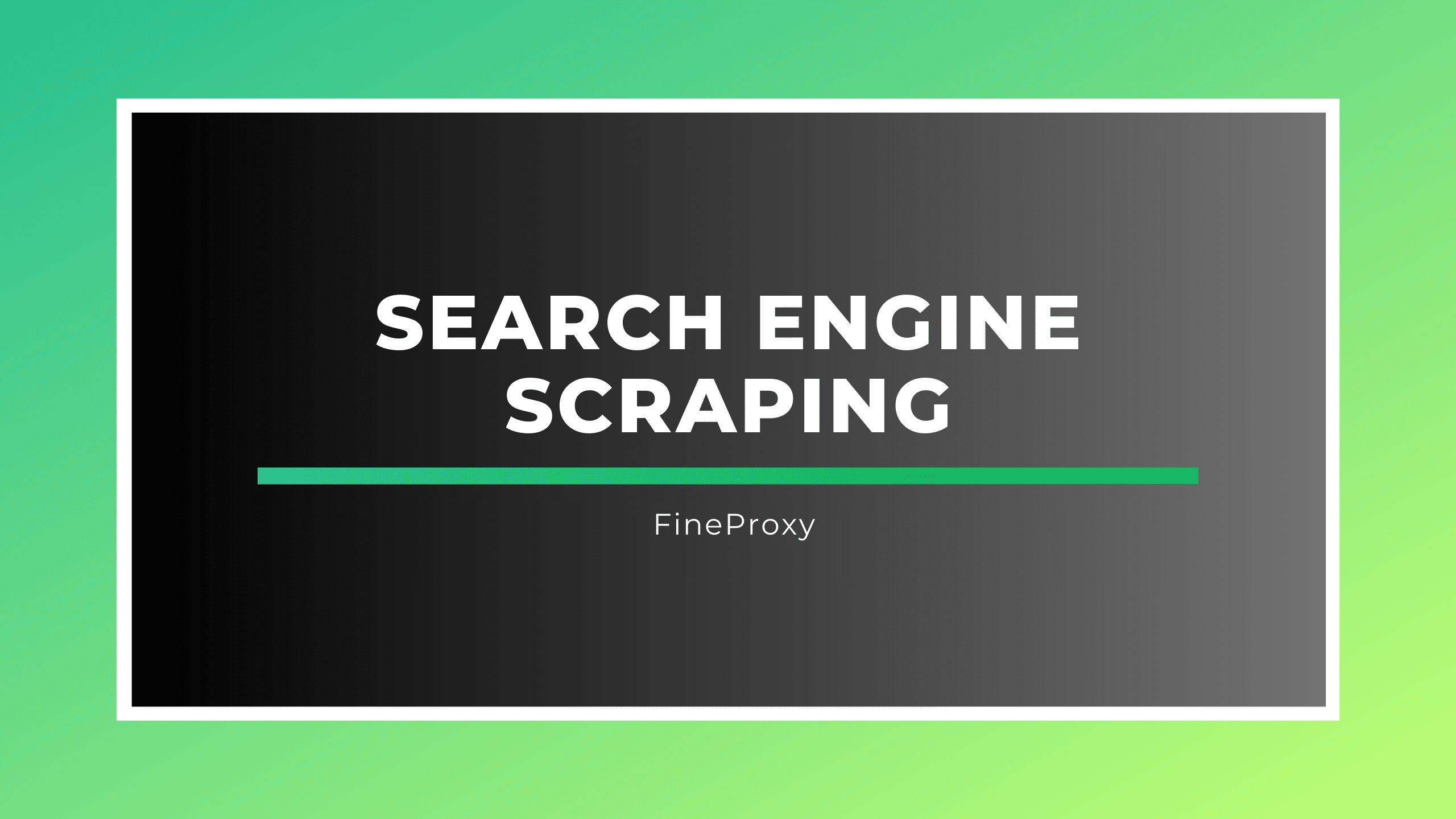
- What is Search Engine Scraping and how does it differ from traditional web crawling?
- Why is Search Engine Scraping considered important for businesses and researchers?
- What are the legal and ethical considerations to keep in mind when engaging in Search Engine Scraping?
- How can one get started with setting up their Search Engine Scraping environment, and what tools are recommended?
- What are some advanced techniques and common pitfalls to be aware of in Search Engine Scraping?

Table of Contents
In today’s data-driven world, information is paramount, and access to relevant data can make or break a business. Enter the world of Search Engine Scraping, a technique that has gained immense significance in recent years. This article will delve deep into the realm of Search Engine Scraping, exploring its fundamental concepts, its critical importance, and the ethical and legal considerations surrounding it.
What is Search Engine Scraping?
Unearthing the Data Goldmine
At its core, Search Engine Scraping is the process of extracting data from search engine results pages (SERPs) and other web sources. It’s the digital equivalent of mining for gold, where the nuggets of value are the data points, and the tool of choice is not a pickaxe, but rather specialized software.
Search engine scrapers are the driving force behind this process, enabling users to navigate the vast web and collect valuable information. This involves sending automated requests to search engines like Google, Bing, or Yahoo, and then extracting the information displayed in the search results. This information can include links, titles, descriptions, and even structured data like reviews or ratings.
Beyond Web Crawling
It’s important to note that Search Engine Scraping goes beyond traditional web crawling. While web crawlers index web pages for search engines, scraping aims to gather specific data from these indexed pages. In essence, it’s a more focused and targeted approach to acquiring web data.
Why is Search Engine Scraping Important?
Informed Decision-Making
In the fast-paced digital landscape, timely access to data is critical for informed decision-making. Businesses, researchers, and marketers rely on data to stay competitive and relevant. Search Engine Scraping provides a direct gateway to a vast repository of data that can be used for various purposes.
Competitive Edge
In the business world, gaining a competitive edge is paramount. By leveraging Search Engine Scraping, organizations can monitor their competitors’ activities, track market trends, and adjust their strategies accordingly. This competitive intelligence can make a substantial difference in staying ahead of the curve.
Legal and Ethical Considerations
Treading Carefully
While Search Engine Scraping offers tremendous benefits, it’s not without its challenges, particularly in the legal and ethical realms. Web scraping activities can sometimes infringe on copyright, privacy, or terms of service agreements. To avoid legal troubles, it’s crucial to be aware of the legal landscape and follow ethical scraping practices.
Getting Started with Search Engine Scraping
In the age of data-driven decision-making, Search Engine Scraping has emerged as a vital tool for extracting valuable information from the vast expanse of the internet. Whether you’re a business looking for competitive insights or a researcher seeking valuable data, understanding the fundamentals of Search Engine Scraping is the first crucial step. In this section, we’ll guide you through getting started with Search Engine Scraping, covering essential aspects such as setting up your scraping environment, choosing the right tools, and mastering data collection techniques.
Setting Up Your Scraping Environment
Before you embark on your scraping journey, it’s crucial to establish the right environment for your operations. This involves:
1. Selecting a Reliable Hosting Solution
Choose a robust hosting solution that ensures stable and uninterrupted access to the internet. A dedicated server or a cloud-based solution can provide the necessary infrastructure for your scraping activities.
2. Installing Necessary Software and Libraries
To execute successful scraping operations, you’ll need to install relevant software and libraries. Python, with libraries like Beautiful Soup and Scrapy, is a popular choice among scrapers due to its versatility and community support.
Choosing the Right Scraping Tools
Selecting the appropriate tools for your scraping needs is pivotal for success. Here are some considerations:
1. Web Scraping Frameworks
Frameworks like Scrapy offer a structured approach to scraping, making it easier to develop and manage scraping projects.
2. Scraping Extensions and Plugins
Browser extensions such as Chrome’s Data Miner or Firefox’s Web Scraper can simplify the process of data extraction for those who prefer a more user-friendly approach.
Essential Data Collection Techniques
Effective data collection is the heart of Search Engine Scraping. Here’s a glimpse of essential techniques:
1. Keyword-Based Scraping
Define specific keywords or search queries to target relevant data on search engine results pages (SERPs). This focused approach ensures you gather precise information.
2. Data Structuring
Extracted data often requires structuring to be meaningful. Techniques like data normalization and cleaning play a crucial role in making the collected data usable.
Advanced Scraping Techniques
While setting up the foundation is vital, advanced scraping techniques take your capabilities to the next level. In this section, we’ll explore some of these advanced strategies:
Handling JavaScript-Generated Content
As many modern websites use JavaScript to dynamically load content, scraping such pages can be challenging. Tools like Puppeteer allow you to scrape data from websites that heavily rely on JavaScript.
Managing IP Blocks and Captchas
To avoid being blocked or identified as a scraper, consider rotating IP addresses using proxy servers and implementing Captcha-solving mechanisms. These tactics ensure uninterrupted scraping operations.
Effective Data Parsing Strategies
Data parsing is a critical skill for any scraper. Techniques like regular expressions and XPath can help you precisely extract the data you need, even from complex and unstructured sources.
Avoiding Common Pitfalls

While Search Engine Scraping offers a wealth of opportunities, it’s not without its pitfalls. Being aware of potential challenges is essential for a successful scraping journey. In this section, we’ll discuss common pitfalls and how to avoid them.
IP and Legal Risks
Scraping can sometimes breach website terms of service or legal boundaries. It’s crucial to operate within the law and respect websites’ terms to avoid legal repercussions.
Data Quality Issues
Scraped data isn’t always perfect. It can contain errors, duplicates, or outdated information. Implementing data quality checks and validation processes is crucial for maintaining the integrity of your collected data.
Anti-Scraping Measures
Websites are becoming increasingly savvy at detecting and blocking scrapers. To circumvent anti-scraping measures, consider using techniques like randomizing user agents, headers, and throttling your scraping requests to mimic human behavior.
Ethical and Legal Considerations

As you embark on your journey into the world of Search Engine Scraping, it’s crucial to navigate with a strong understanding of the ethical and legal considerations that underpin this practice. In this section, we will explore the principles that guide ethical scraping and the legal boundaries that must be respected. We will delve into the importance of adhering to website terms of service, upholding data privacy and compliance, and understanding copyright and fair use laws.
Respect for Website Terms of Service
One of the cornerstone principles of ethical scraping is respect for website terms of service. When you visit a website, you are often bound by a set of terms and conditions that dictate how you can use the site and its content. Scraping a website without permission or in violation of these terms can lead to legal consequences and damage to your reputation.
Understanding Robots.txt
Many websites publish a file called “robots.txt” that outlines which parts of their site can be crawled by search engines and other automated agents. As a responsible scraper, it’s essential to check and abide by the directives in a site’s robots.txt file. Ignoring this can result in actions against you, such as IP blocks or legal action.
Data Privacy and Compliance
In an era of heightened awareness regarding data privacy, it’s imperative for scrapers to prioritize data privacy and compliance. When collecting data, particularly personal or sensitive information, it’s essential to respect individuals’ privacy rights and comply with relevant data protection laws.
Consent and Anonymization
Whenever possible, seek explicit consent from website owners or users before scraping their data. Additionally, consider anonymizing the data you collect to remove personally identifiable information, reducing the risk of privacy violations.
Copyright and Fair Use
Scraping content from websites raises questions about copyright and fair use. While scraping for personal use or research purposes may be considered fair use under certain circumstances, scraping for commercial gain or without proper attribution can lead to copyright infringement claims.
Attribution and Fair Use
Always provide proper attribution when using scraped content, and be aware of the principles of fair use under copyright law. Fair use exceptions may apply when using copyrighted material for purposes such as criticism, commentary, or education.
Tools and Resources for Search Engine Scraping
Now that we’ve explored the ethical and legal landscape, let’s turn our attention to the tools and resources that can enhance your Search Engine Scraping endeavors. These tools are essential for a successful and efficient scraping operation.
Libraries and Frameworks
Libraries and frameworks are the backbone of any scraping project. They provide the necessary functionality to fetch and parse web pages. Popular libraries like Beautiful Soup and Scrapy for Python are widely used for their flexibility and ease of use.
Proxy Services
To avoid IP blocks and maintain anonymity while scraping, proxy services are invaluable. They allow you to route your requests through different IP addresses, making it more challenging for websites to detect and block your scraping activities.
Scraping Best Practices
As a responsible scraper, adopting best practices is essential to ensure your scraping efforts are successful and respectful of website owners’ interests. Here are some key best practices to keep in mind:
- Rate Limiting: Avoid overloading websites with too many requests in a short time. Implement rate limiting to mimic human browsing behavior.
- User Agents: Use different user agents to make your requests appear as if they’re coming from various web browsers and devices.
- Error Handling: Develop robust error-handling mechanisms to deal with unexpected issues during scraping gracefully.
Case Studies: Real-World Applications
As we journey through the fascinating realm of Search Engine Scraping, it’s essential to understand how this powerful tool can be applied in real-world scenarios. In this section, we will explore case studies that showcase the practical applications of Search Engine Scraping across various domains, including data-driven decision making, business intelligence, and academic research.
Data-Driven Decision Making
Data-driven decision making is at the heart of modern business strategies. Organizations rely on data to inform their choices, and Search Engine Scraping provides a direct pipeline to valuable information.
Case Study 1: Market Research
Imagine you’re a market analyst aiming to understand consumer sentiment about a particular product. By scraping online forums, social media, and review sites, you can gather user-generated content, analyze sentiments, and identify trends. This data-driven approach allows you to provide actionable insights to your clients, helping them make informed decisions about their products and marketing strategies.
Business Intelligence
In the competitive landscape of business, having a competitive edge is vital. Search Engine Scraping can be a game-changer in gathering crucial business intelligence.
Case Study 2: Competitor Analysis
Picture yourself as a business owner looking to gain insights into your competitors’ pricing strategies. By scraping e-commerce websites and comparing their product prices to yours, you can adjust your pricing strategy to stay competitive in the market. This application of scraping provides a real-world advantage in the business world.
Academic Research
Academic research benefits greatly from the vast amount of information available on the internet. Search Engine Scraping opens up new avenues for gathering research data.
Case Study 3: Linguistic Analysis
In the field of linguistics, researchers often study language patterns and variations across regions. Search Engine Scraping can help gather a massive corpus of text from diverse sources. By scraping online newspapers, forums, and blogs, linguists can analyze language usage trends and study linguistic evolution over time.
Wrapping Up: Your Path to Web Data Mastery
Now that we’ve explored the real-world applications of Search Engine Scraping, it’s time to consider your path towards web data mastery. In this final section, we’ll discuss future trends in Search Engine Scraping, the importance of building a web scraping strategy, and resources for further learning.
Future Trends in Search Engine Scraping
As technology evolves, so does the field of Search Engine Scraping. Future trends in this field are likely to include more advanced methods for handling dynamic content, improved techniques for overcoming anti-scraping measures, and increased integration with artificial intelligence and machine learning.
Building Your Web Scraping Strategy
To excel in web data mastery, it’s crucial to build a robust scraping strategy. Consider factors like target websites, data storage, frequency of scraping, and ethical considerations. A well-thought-out strategy will guide your scraping efforts and ensure efficiency and compliance.
Resources for Further Learning
Learning is an ongoing process, especially in a dynamic field like Search Engine Scraping. Fortunately, there are abundant resources available to help you expand your knowledge and skills.
Online Courses and Tutorials
Websites like Coursera, Udemy, and edX offer courses on web scraping and data analysis. These courses cover a range of topics, from basic scraping techniques to advanced data manipulation.
Online Communities and Forums
Joining online communities like Reddit’s r/web scraping or Stack Overflow can be immensely valuable. These forums provide a platform to ask questions, share knowledge, and learn from experienced scrapers.
Books and Documentation
Several books and documentation resources, such as “Web Scraping with Python” by Ryan Mitchell or official documentation for web scraping libraries like Scrapy and Beautiful Soup, can be valuable references.
In conclusion, Search Engine Scraping is a versatile tool with wide-ranging applications in data-driven decision making, business intelligence, and academic research. As you embark on your journey towards web data mastery, keep an eye on future trends, build a solid scraping strategy, and make use of the abundant resources available for further learning. With dedication and continuous learning, you can harness the full potential of Search Engine Scraping to excel in your chosen field.






Comments (0)
There are no comments here yet, you can be the first!